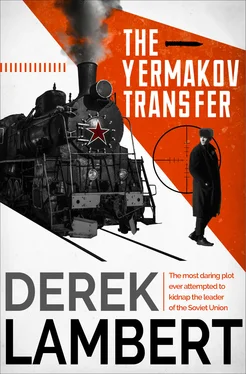“What can you do?”
The Volga swerved violently to avoid a taxi with a drunken driver.
“I can show the world,” Pavlov said, “that we have balls.”
* * *
They met mostly in the open air, on the Lenin Hills, or in the birch forests to the west of the city where Muscovites went swimming from the river-beaches in the summer and cross-country ski-ing in the long winter.
Sometimes they met in a small apartment near the junction of Sadovaya Samotetchnaya and Petrovka. While they talked about Moscow Dynamo football team, mistresses and money they systematically searched the room for microphones. De-lousing it, they called the process. So far no bugs had been found.
They only met three at a time to avoid arousing suspicion. On this evening there was Pavlov, Yury Mitin, poet and State prize winner, and Ivan Shiller, a journalist on Pravda specialising in Jewish affairs. Each had cultivated an anti-Zionist front; none had Jew on his passport.
Each was fierce in his belief, none more so than Shiller, his anger fomented by the daily betrayals he had to perpetrate in his newspaper. Yesterday he had finished rounding up fifty prominent Jews and ordering them to sign a letter condemning Israeli aggression in the Middle East.
The letter also referred to emigration. “We were born and bred in the Soviet Union. It is here that our ancestors of many centuries lived and died. There is no reason why we should go to Israel. And, anyway, how is it possible to ‘return’ to a place where one has never been?”
“And do you know” – Shiller spoke with bitter contempt – “that some of them were quite happy to sign?”
Shiller was second-in-command of the Zealots who took their name from the 960 Jewish martyrs who killed themselves rather than surrender the citadel of Masada to the Romans. Death before dishonour. The Masada Complex symbolised the spirit of Israel: it symbolised the spirit of Russia’s small band of Zealots.
To avoid detection they used code-names each having a trade beginning with the letter P in the English language. Pavlov was the Professional, Mitin the Poet, Shiller the Penman.
Shiller was a gaunt man with a muddy complexion, hollow cheeks and bad teeth. His repressions were even stronger than Pavlov’s because, unlike Pavlov, he was a practising Jew. His greatest temptations came at such times as the New Year and the Atonement or the days when Yizkor , the prayer for the dead, was offered. Then he wanted to visit the Synagogue; but if he did he would alert the police. Even to be near the synagogue on Arkhipova on the Sabbath was dangerous because it was under K.G.B. surveillance. So Shiller prayed in private, ate his matzos in secret, recited the Passover prayer “Next year in Jerusalem”, and waited.
In one way Shiller was weaker than Pavlov: he was too religious to be a ruthless killer: Pavlov had no such inhibitions. But if there was ever to be any rift, any struggle for power, it would be between these two men.
The apartment belonged to Mitin the poet. He made coffee while, on a rickety table covered with linoleum, under the benign gaze of Lenin framed on the wall, the other two men played chess. A get-together of old friends should the 1 a.m. knock on the door be heard.
Shiller said bitterly: “Last week I helped to arrange the publication of a statement from our religious leaders . “Like citizens of other nationalities, Jews enjoy all the rights guaranteed by the Constitution, including the right to profess their own religion.”
He knocked aside one of Pavlov’s pawns with his bishop. “I got six so-called Rabbis’ signatures on that statement.”
“Shit on the Rabbi ,” said the poet. He was a slim young man with a pale face, a monkish fringe of hair and a foul mouth. Whereas Shiller would have liked to smuggle Bibles into Russia, Mikin would have liked to smuggle Soviet literature out. His frustration found a small outlet in profanity, the brutalising of his love-affair with words.
Pavlov said: “We mustn’t get impatient. We’re all making sacrifices. We are getting nearer our goal every day.” He moved one of his own black bishops and called: “Check.”
“What goal?” Shiller asked. He frowned at the wooden board and pieces made in a labour camp. “Since when have we had a goal?”
“Piss on you,” exclaimed the poet. “We’ve had an ideal for years, a goal for months.”
“Ah,” Shiller muttered, “that goal. I apologise. I thought for a moment Pavlov meant we had a way of achieving it.”
Shiller moved his knight and Pavlov said: “You’re in check. Perhaps you misheard that as well.”
Shiller took back the knight without apologising. “How are we getting nearer our goal?”
Pavlov took a sheet of paper from his pocket. It had eleven names on it. Pavlov read out the first name, adding the data from memory.
“Skolsky.” He paused, thinking. Yosef Skolsky, aged forty-two. Top physicist at the Scientific Institute of Nuclear Physics, Moscow. A pupil of Academician Andrei Sakharov, the father of the Soviet atom bomb, our leading dissident. Two applications for exit visas to Israel. Refused on the grounds that his relatives in Tel Aviv were too distant.”
He read out another name. “Kremer, Yakov. Corresponding member of the U.S.S.R. Academy of Sciences. Aged fifty. One application refused. Again – remoteness of kin.”
The penultimate name was: “Zivz, Mikhail. Aged twenty-eight. Brilliant nuclear physicist working at the Scientific Research Centre in Akademgorodok fifteen miles from Novosibirsk. Permission refused once. Reason – still subject to Army service.”
The last name was Gopnik.
Shiller asked: “Who’s he?”
Pavlov swooped with his queen. “Checkmate,” he said.
“Who is Gopnik?”
“My conscience.”
Mitin served the coffee. “Since when did you have a conscience?” he asked.
Pavlov sipped the sweet black coffee. “It doesn’t matter.” He ran his hand through his hair. “What matters is this: ten of those eleven names constitute the human components of one hydrogen bomb. Quite a gift for the Promised Land, eh?”
* * *
But how? Part of the answer came to Viktor Pavlov at the Leningrad skyjack trial. This skyjack had failed miserably, but even if it succeeded, it would only have benefited a handful of nonentities. And, in any case, skyjacks were old-hat, bearing the hallmark of Arabs, Cubans and maniacs. An old-fashioned kidnap had more panache.
Once again the adrenalin started to flow. What if they kidnapped a Kremlin leader and held him against the release of the ten nuclear-physicists? The idea had a beautiful suicidal glory to it, the Masada Complex. Except that it was totally impracticable.
Or so it seemed until Viktor Pavlov heard that Vasily Yermakov was travelling on the Trans-Siberian Railway in the October of 1973, the year of the 25th anniversary of the founding of the State of Israel.
CHAPTER 2
The first stop was Yaroslovl. Trans-Siberian No. 2 pulled in sharp at 14.02 Moscow time. But it wasn’t until Sharia, which they reached on time at 20.22, that the first Zionist agent boarded the train.
He was a stocky man with a white face and a scar beside his mouth. He wore a black overcoat, fur boots and a sealskin hat.
He stood near a stall where blunt-faced women wearing blue scarves round their hair sold food from a canvas-covered pushcart. Meat pastries, fried chicken and fish, icecream and beer.
As the train slid into the station the agent whose name was Semenov clapped his gloved hands together. Cold or nerves or both.
The Trans-Siberian hadn’t yet reached the snow. But the air was sharp with frost glittering on the platform. It was almost dark.
Читать дальше












